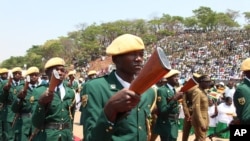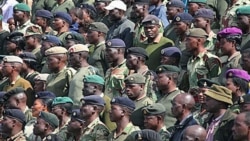While the military and other security agents should be apolitical, according to the country’s laws, in Zimbabwe they are heavily involved in politics and recently, President Robert Mugabe, said they were involved in a fierce succession war raging in the ruling party.
Sections 208, 211 and 218 of Zimbabwe’s constitution, which govern the operations of security services, including the Zimbabwe Defense Forces, forbid the military from participating in partisan politics or interfering in electoral affairs.
According to Section 211, Sub-section 3 of the constitution, the Defense Forces must respect the fundamental rights and freedoms of all persons and be non-partisan, national in character, patriotic, professional and subordinate to civilian authority as established by the nation’s supreme law.
Section 208, Sub-section 2 of the constitution, which outlines the expected conduct of members of the security services, stipulates that it is illegal for the security sector to be partisan and to further the interest of a political party.
It reads in part, “Neither the security services nor any of their members may in the exercise of their functions act in a partisan manner, further the interests of any political party or cause, prejudice the lawful interests of any political party and that serving members of the security services must not be active members or office bearers of any political party or organization.”
The military has been openly involved in the politics of the ruling Zanu PF party and at some point when Mr. Mugabe’s leadership was under threat from the opposition, army generals came out and declared that only those with liberation credentials would be allowed to rule Zimbabwe.
The army has been used to campaign and run elections and there has been heavy militarization of government departments and ministries.
Experts say while all this is illegal, it has not been challenged because the security forces were carrying out services in support of their commander in chief President Mugabe.
Zimbabwe Lawyers for Human Rights senior programs manager, Dzimbabwe Chimbga, says the military has no role whatsoever in the governance of the country.
Chimbga said, “The army, the police and any other security apparatus should not be involved not only in the issue of succession but the issue of governance itself that is left to the civilians in accordance with the constitution of Zimbabwe.”
While concurring with Chimbga, political analyst Dr. Pedzisai Ruhanya of the Zimbabwe Democracy Institute, argues that indications are that the military is currently siding with President Mugabe in the current succession fights in the ruling party.
“But should the military decide to be belligerent, to be adversarial to President Mugabe the leadership of the country, they will be thwarted without doubt and they know it and they will not do it and it is not desirable, it is illegal it is unconstitutional and it must not be supported by any quarter in this country,” said Rupanga
But Vivid Gwede, another independent political commentator, says with the succession fights intensifying in the ruling party, the military could think otherwise.
Gwede said, “We don’t know whether this will remain the case given that succession issues also have to do with the personal future of some of the leaders of the security forces.”
Independent political analyst, Fortune Gwaze, however, says he does not see this happening, adding that while it has happened in West Africa it has never occurred in southern Africa.
There are no indications or precedence’s as and when the military has defied a directive from the commander in chief because that is tantamount to treason
A member of the Zanu PF Youth League, Jawet Mhizha, argues that Zimbabwe has a disciplined military that is respected on the continent and the world over.
He says the military is therefore fully behind its commander-in-chief President Mugabe, adding that there is nothing wrong if the military dabbles in politics for the good of the country.
“Whatever their involvement it would be in the interest of the country and protect the sovereignty of this national called Zimbabwe,” said Mizha
Analysts agree, however, that the military could advise President Mugabe, who to choose as a successor and it is clear that they want someone who would protect their interests and preserve the liberation war legacy.
Succession fights continue in the former liberation party with Mr. Mugabe’s deputies, Emerson Mnangagwa and Phelekezela Mphoko, aligning themselves to the two main factions.
Mnangagwa reportedly belongs to the so-called Team Lacoste, which has the backing of most war veterans and the military, while Mphoko belongs to Generation 40 that allegedly has the backing of First Lady Grace Mugabe.






